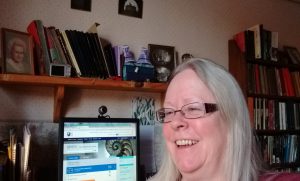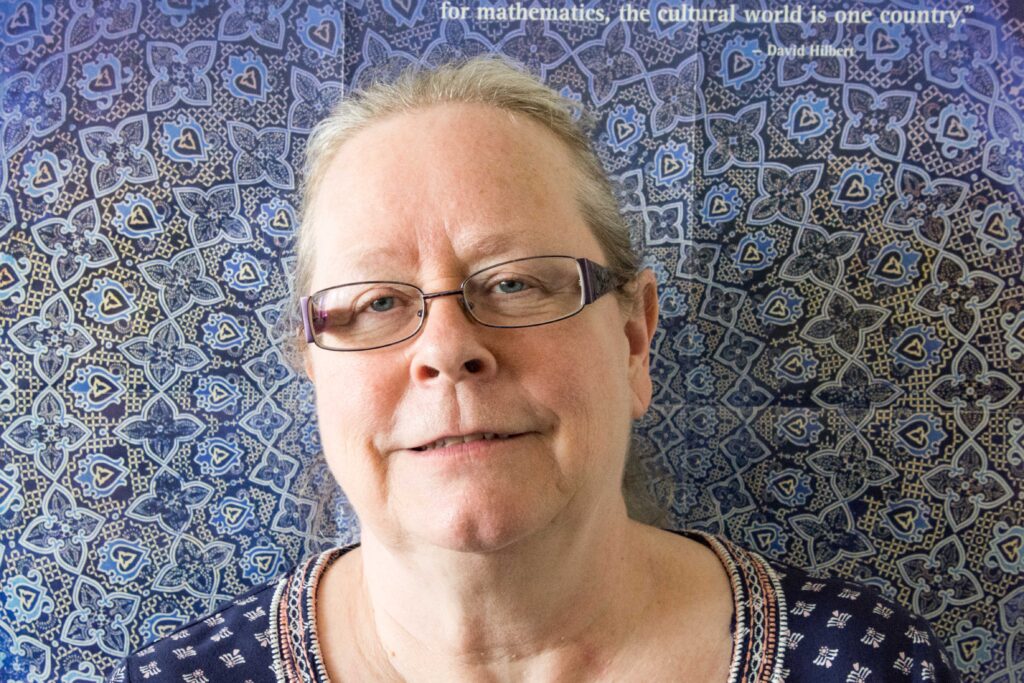Angie McConnell is a long-standing associate lecturer in Mathematics Education at The Open University. She has chaired several undergraduate and postgraduate modules, and is currently heading up ME620, Mathematical Thinking in Schools. Angie is retiring as a central academic this summer, so we pinned her down for her thoughts on mathematics, teaching, and what makes The Open University special.
Congratulations on your retirement!
Thank you very much.
How did you first get involved with The Open University?
I first joined as a student in 1979. I’d done a traditional degree at Liverpool University, but – due to far too many extra-curricular activities – I hadn’t done as well as I’d hoped, and I thought, “I’m better than that, I can do that.” So, I joined the OU and ultimately got a first which pleased me no end. As I student, I became involved with the Students’ Association through the 80s, through the Thatcher years, and a campaign to save the Open University. I was a student rep on the University Council for some time through the 80s and 90s and then I started tutoring on some postgraduate modules.
There’s a lot of history there. What are your favourite memories of working for The Open University?
I think my all-time favourite memories are from attending graduation ceremonies. I’ve attended quite a few over the years, and what makes them so wonderful is the cross-section of people. Everybody’s there: the young, the old, people with various disabilities… for me, The Open University was the university of the second chance, but for some people it’s also the university of the first chance, for people who wouldn’t have gone to a traditional university but are nevertheless capable of getting degrees.
What’s wonderful is when people walk across the stage, and as they shake hands with the people on stage, sometimes there will be a voice at the back going, “there’s my daddy!” or “there’s my mummy!” Someone wise once said to me that the only thing harder than being an OU student is living with an OU student, and you realise that behind each of these people who have just achieved a degree there’s a whole team of family and friends who have supported them, done the washing up, made cups of tea, deferred holidays when there’s been an exam and so on. And I love graduation ceremonies because you see this.
As well as your work with The Open University, you have a lot of teaching experience to your name in different sectors.
That’s right. I did ten years in a secondary school, an 11-18 comprehensive school, and then I did 30 years in further education.
What are some of the key differences in how you approach teaching mathematics in further education?
I enjoyed the move to further education because the learners were post-16, and by and large they were there by choice. In the latter years, I was teaching a lot of adult returners, and that was really rewarding. There were people who for all sorts of reasons hadn’t got GCSE Mathematics, and somewhere along the line they needed it for a job, or a promotion, or whatever. They would turn up in class and – not kidding you – the first session in September, they were white knuckled. One student told me they had come to battle their demons, and so many of them had bad experiences in the past. So it was my job to make them not scared of maths. I used a lot of humour to get through to them, and by and large it worked. They used to come out of those classes, and they weren’t scared of maths anymore.
I always think that further education colleges are sort of the Cinderella service of education – they do great work, but don’t get the same funding as higher education. Working with adult learners was joyous. What wasn’t joyous was when somebody higher up the food chain decided that everybody had to do GCSE Mathematics, whether they wanted to or not [in response to the Wolf review, 2011]. So you would get classes of resentful 17-year-olds who did not want to be there, and didn’t see the point. To my mind, this can make people hate maths. It doesn’t engender a love of maths.
You have seen a lot of changes in mathematics education. What do you think have been the most important changes, and what do you think is interesting about what is happening today?
I think mathematics teaching is evolving to become more collaborative. When I started in 1975, the teacher was expected to put an example on the board, ask the pupils if they understood, and then give them 20 more of the same. If they didn’t get it, they just got left behind. Now I think there is a much bigger move towards getting children in schools to understand.
There are a lot of good materials out there. There was a box of stuff which used to land in the further education college which had all sorts of interesting activities.
The Standards Unit?
Yes, that was it. That was great. I took that, and I used it a lot, and it was getting people to do the same mathematics, but in a more exciting, interesting, innovative, and collaborative way. In 1975 you wouldn’t get students to work in groups – the ideal was that they worked in silence!
I think getting learners to work in groups and spark off each other is where mathematics education is going, and that’s good. But I think, sadly, there aren’t enough mathematicians in schools and in further education colleges.
Do you mean mathematicians, or do you mean maths teachers?
Mathematicians who are maths teachers – there are a lot of maths teachers who aren’t confident mathematicians and are scared to innovate. We used to run a programme for primary teachers to get them more comfortable teaching mathematics, so that they would use novel ways of approaching the content. We said we could offer it anywhere in the country – and got the South West and the North East, which I think was someone’s idea of a joke! We would flit down to Plymouth and up to Newcastle to get primary teachers more comfortable teaching mathematics, so that they would like mathematics themselves, and communicate that to their pupils.

As you begin your retirement, what are you most looking forward to?
Lots more travelling! I don’t want to lose touch with mathematics, but I plan to do as much travel as I can. For years I’ve believed that you should have the holiday of a lifetime at least once a year!
One last question: what advice would you give to someone starting out with mathematics teaching?
It’s hard when you start, but it’s one of the most rewarding jobs you can ever, ever do. You’ll work every hour God sends, but the rewards… they can’t pay you enough for that. It’s a fantastic job working with people and helping them – it’s a wonderful, wonderful thing to do.
Brilliant. Thank you for your time.
This interview has been edited for length and clarity.
The Standards Unit materials for improving learning in mathematics are available at the time of writing via STEM learning at https://www.stem.org.uk/elibrary/collection/2933 (Accessed May 2023).

